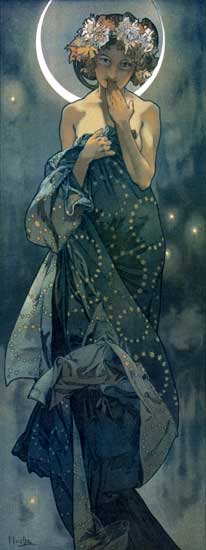It had different names, in Vienna
it was Sezzesionstil –(Gustav Klimt, Hoffman), In Germany it was Jugendstil
(-Otto Eckman, August Endele), In Italy it was Stile Liberte, In Spain it was
Modernista (- Anton Gaudi) and in America it was considered to be an extension
of the Arts and Crafts movement (-Louis Sullivan).
It began in a shop and interior
design gallery in Paris called Le Maison de l’arte Nouveau owned by Samuel Bing
in 1895. Art Nouevau symbolized the “new art form”. It was happening at the
time of the French Belle Epoque, before the first world war. This was a time
where there was a prosperous middle class, and a lot of pleasure seeking
bourgoise.
Artists of the time were:
Hector Guimard - Street Furniture
Eugine Grasset – Encre L. Marquet (1899)
Jules Cheret – Hippodrome (1895)
Alphonse Mucha – The
Moon (1902)
Louie Fuller – Dance performer whose graceful serpentine
movements inspired her sculptures.
Audrey Beardsley – follower of Aesthatic Movement with Lars
Tiffany and Francois Eugene Rousseau ( they influenced the Art Nouveau movement
through its use of abstracted Japanese forms).
Edward Burnes Jones – the knight’s farewell
Beardsley – J’ai Baise ta Bouche
è
large dark areas contrasted with large white
ones
è
fine detailed patterns
è
estatic & erotic
è
sinous
è
a style more grotesque
-
Peacock skirt
-
Isolde (1898)
Will Bradley – like Beardsley but emerged when Beardsley
died, situated in America
In Belgium: Henry van der Velde – Stained Glass panels
Brussels
In Glasgow: Charles Renne Mackintosh – early organic style
-
compared the progressive modernity with the
spirit of romanticism
Art Nouveau: Stylization to the extreme
Curves
and shapes to understand underlying geometric form
In Austria: led by Gustav Klimt. Kolomon Moser & others
– evolved from Symbolist movement & French Art Nouveau
Kolomon Moser
Ver
Sacrum poster
Book stamp for
Fritz
In Germany emerged the Deutscher Werkbund, consisting of
Peter Behrens, Mies Van der Rohe and Josef Hoffman. This organization’s aim was to standardize and
rationalize form for machine production.
Peter Behrens was linked with the Jugendstil, and he was
very inspired by William Morris. He was a pioneer Industrial Designer, and was
praised as a gesamthuntwerk (total work of art). He says, “all aspects of
design must be given equal attention and be coordinated in the same style”.
In design he was important for his early symbolic prints,
which were clean & sober, had the element of symmetry, used contrasting
colours, were artistic yet rational, and used elongated Roman calligraphic
letter types.
He also influenced Walter Gropius when opening the Bauhaus.
links:
http://www.slideshare.net/umertariq93/modern-architectures-umer-tariq
http://www.bpib.com/illustrat/mucha.htm
http://www.theartstory.org/movement-art-nouveau.htm
http://www.slideshare.net/umertariq93/modern-architectures-umer-tariq
http://www.bpib.com/illustrat/mucha.htm
http://www.theartstory.org/movement-art-nouveau.htm








No comments:
Post a Comment